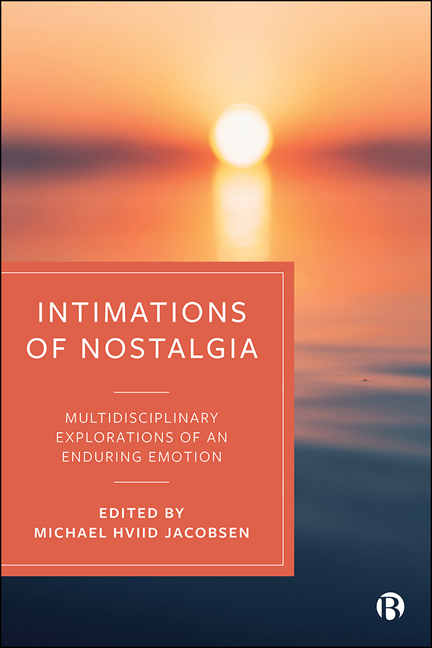Book contents
- Frontmatter
- Contents
- Notes on Contributors
- Preface and Acknowledgements
- Introduction: The Many Different Faces of Nostalgia – Exploring a Multifaceted and Multidisciplinary Emotion
- 1 Philosophy and Nostalgia: ‘Rooting’ within the Nostalgic Condition
- 2 History and Nostalgia: Historicizing a Multifaceted Emotion
- 3 Political Theory and Nostalgia: The Power of the Past in the History of Political Thought
- 4 Sociology and Nostalgia: Micro-, Meso-and Macro-level Dimensions of an Ambiguous Emotion
- 5 Psychology and Nostalgia: Towards a Functional Approach
- 6 Anthropology and Nostalgia: Between Hegemonic and Emancipatory Projections of the Past
- 7 Media Studies and Nostalgia: Media Philosophy and Nostalgizing in Times of Crisis
- 8 Marketing and Nostalgia: Unpacking the Past and Future of Marketing and Consumer Research on Nostalgia
- 9 Literature and Nostalgia: Vestiges of Paradise
- 10 Architecture and Nostalgia: The End of History, the End of the Future and the Prospect of Nostalgia
- Postscript: On Nostalgia of the Future and the Future of Nostalgia – Some Scattered Concluding Observations
- Index
6 - Anthropology and Nostalgia: Between Hegemonic and Emancipatory Projections of the Past
Published online by Cambridge University Press: 13 May 2022
- Frontmatter
- Contents
- Notes on Contributors
- Preface and Acknowledgements
- Introduction: The Many Different Faces of Nostalgia – Exploring a Multifaceted and Multidisciplinary Emotion
- 1 Philosophy and Nostalgia: ‘Rooting’ within the Nostalgic Condition
- 2 History and Nostalgia: Historicizing a Multifaceted Emotion
- 3 Political Theory and Nostalgia: The Power of the Past in the History of Political Thought
- 4 Sociology and Nostalgia: Micro-, Meso-and Macro-level Dimensions of an Ambiguous Emotion
- 5 Psychology and Nostalgia: Towards a Functional Approach
- 6 Anthropology and Nostalgia: Between Hegemonic and Emancipatory Projections of the Past
- 7 Media Studies and Nostalgia: Media Philosophy and Nostalgizing in Times of Crisis
- 8 Marketing and Nostalgia: Unpacking the Past and Future of Marketing and Consumer Research on Nostalgia
- 9 Literature and Nostalgia: Vestiges of Paradise
- 10 Architecture and Nostalgia: The End of History, the End of the Future and the Prospect of Nostalgia
- Postscript: On Nostalgia of the Future and the Future of Nostalgia – Some Scattered Concluding Observations
- Index
Summary
Introduction: Anthropology's dilemma, anthropology's advantage
This chapter should perhaps have been titled ‘Nostalgia in Anthropology’. Anthropologists often labour to preserve vanishing or already extinct cultures. As a discipline which has undergone a particularly wrenching confrontation with its colonial past, anthropology has forthrightly addressed the role of nostalgia in its complicity with hegemonic ideologies – notably colonialism and racial hierarchy – which destroyed whole cultural complexes, and which it has since resolutely criticized. Anthropologists are well placed to appreciate the pain (Greek algos, a term perhaps better glossed as ‘regret’) conveyed by the etymology of ‘nostalgia’, thereby potentially recovering the emotional and affective intensity of nostalgia still conveyed in the Greek term today (see Seremetakis 1994: 4). They investigate how the concept of nostalgia is locally (‘emically’) understood (Orr 2017: 644), and how one might apply the English term without violating the multiplicity and complexity of concepts in local languages that we too easily read as nostalgia. Nostalgia takes on different meanings according to the historical, cultural and sensory contexts in which it is evoked (Emoff 2002).
There are indeed multiple variations in the discipline's use of the term ‘nostalgia’, almost always qualified by an adjective conveying temporal and political specificities. Olivia Angé and David Berliner (2014) have already laid out a magisterially comprehensive account. Placing the many approaches and usages in a larger philosophical and historical context, their essay will long remain the gold standard for such a summary, laying out both the nostalgic character of much early anthropology and the sometimes excessive fierceness with which its modern practitioners have rejected the nostalgic trope of cultural loss.
Confrontation with the discipline's origins offers the compensation of reflexive clarity. Anthropology, arriving on the coat-tails of colonialism, initially served both Victorian disdain for conquered ‘savages’ and its converse – lamentation for the corruption of the paradise of which the savages were viewed as the last survivors. It was an exercise in the nostalgic imagination and reconstruction of what colonialism had resolutely and ruthlessly destroyed. This is the cruel truth of what Renato Rosaldo (1989) has dubbed ‘imperialist nostalgia’. The early social evolutionists, or ‘survivalists’ as they are aptly called (see Hodgen 1936), saw in the conquered peoples the living fossils of their own social and cultural ancestors.
- Type
- Chapter
- Information
- Intimations of NostalgiaMultidisciplinary Explorations of an Enduring Emotion, pp. 129 - 150Publisher: Bristol University PressPrint publication year: 2021



